The Ryburgh Foundry
Prologue: The years to 1878
In the absence of much hard evidence the early history of the Foundry at Ryburgh can be only sketched in from various pieces of evidence so far found on maps, deeds, press reports and census returns. My thanks are due to Nicky and Nigel Donohue for their kindness in making available the early Manor House deeds. Until further information surfaces, the story so far is as follows:
Before the coming of the railway in 1849, much of the land on the North side of the Street from the Manor House along to the fields that were cut through by the new line was owned by Edmund Wodehouse and until 1850 was leased by Hugh Fitzroy Esq., who resided at Sennowe (occupation "Army", so says the 1841 census).The Estate came up for sale on August 13th 1850 coincidently, with the Advowson of St Andrew's Church as Lot 2 of the sale.
In 1866 an elderly farmer, landowner and magistrate named Isaac Everitt residing in Ware in Herts. took out a 12 year lease on the Manor House property. At this time he was leasing it from agents of “Boycott's Settlement”, which looks to have been a quite complicated series of different bequests and beneficiaries and legal wrangling that extended over several years. The rental was £40 per annum payable half-yearly.
![]()


15 months later Isaac took out an 11 year lease on the 15 acres of land fronting what is now Station Road, from the Manor House itself to the Station Granary building. The rent was £37-18s-0d.per annum.


He moved to Ryburgh with his second wife, who was his junior by an ever changing amount in successive census years.! Maria Flaxman (nee Cross) had been, after the death of his first wife, governess to his 6 children.

After their marriage they had one son, Percival born May 12th 1856 in Limpenhoe. He attended Dr Jessop's Norwich Grammar School from 1868 to 1870 and in 1871 was boarding at Dr Pilling’s Guildhall School in Dereham.
The following portrait and information regarding Dr Jessopp is found in a private publication with the title:
Norfolk Leaders : Social and political
by Ernest Gaskell and cost Three Guineas



By 1872 Percy had already come to the attention of the press when the Norfolk Chronicle reported the following occasion on 19th August 1872, and which was one of the "Remarkable Events" included in Charles Mackie's Norfolk Annals Vol 2:
The first really notable journey upon a bicycle was performed by Percy Everitt, of Ryburgh, a lad aged 16. He started at 4.45 a.m. from Ryburgh station, and rode to Newmarket, where he had breakfast; thence to Whittlesford, where he lunched; and at 5.30 p.m. he reached Ware, in Hertfordshire, having accomplished the distance of 110 miles in about 12½ hours. Everitt rode one of the first of the rubber-tyred bicycles—a machine of Coventry make, known as the “Ariel.”

************
The following appeared in The Engineer on July 4th 1879:
Messrs. Everitt, Adams, & Co., of St. Andrew’s Works, Ryburgh, Norfolk, a new firm, exhibit a very novel ploughing engine, which we shall illustrate in an early impression. One member of the firm has for some years worked ploughing engines; that is to say he has hired them out. In this way he acquired much experience, and arrived by degrees at certain conclusions to what he wanted.
Assuming that Percy Everitt is the member of the firm referred to above, following his press debut in 1872 and the celebrated bicycle ride from Ryburgh to Ware, we next find him in the newspaper archives in 1874 when the following report from Fakenham found in the Norwich Mercury tells a story of a very fortunate and enterprising 18 year old:

It is stated in the reports of the Harrison v Harrison & Everitt divorce case in July 1886 that:
“evidence was given to the effect that in 1878 and 1879 he (Percival Everitt) was working ploughs at a town in Norfolk, where his father had set him up in business as a mechanical engineer.”
and in June 1875 several of these adverts appeared in the Lynn Advertiser showing that he meant business:
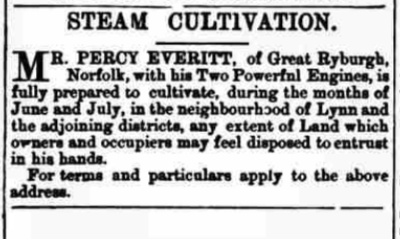
Although this illustration from The Engineer dates from 1876, this is very much the sort of machine that Percy must have taken delivery of and which he in due course tried to improve upon:
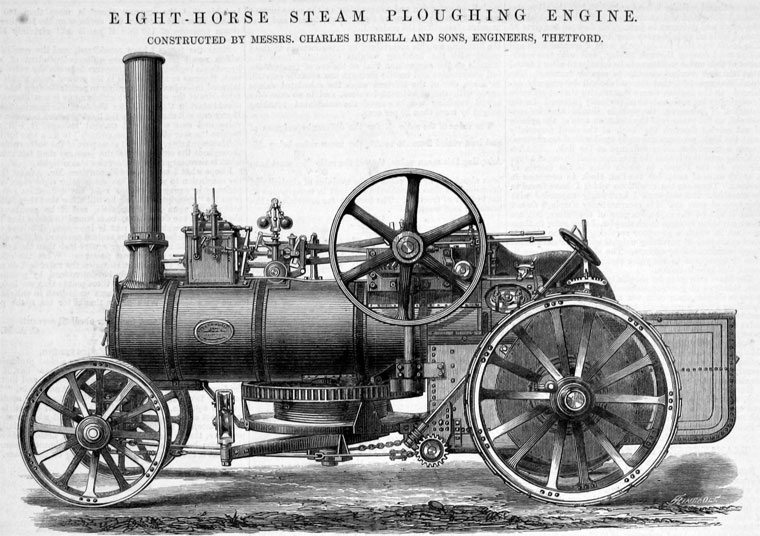
In addition this year we find him playing in rugby and cricket teams for Fakenham and Sennowe along with Walter Mesney, also the son of a St. Andrew’s Churchwarden. He fancied himself as a bit of an entertainer and we find him at Wells in the Assembly Rooms in December 1875 singing “The Frenchman, (Tra, la, la, bong) and created cheers and laughter.”
He is however busy being the young man about town in these early years, again from Harrison v Harrison & Everitt:
“Mr. Everitt, as further evidence to disprove the charge against him, stated that some twelve or thirteen years ago (1874 or 1873) he formed immoral relations with a Mrs. Forster, with whom he stayed on his coming up to town from time to time, and whom he lived with after 1880, when he came to reside in London”
This is borne out by Percy’s two entries in the 1881 Census when his father counts him in Ryburgh and Mrs. Forster, Actress in Sutherland Place Westminster, counts him as a Visitor. Is Percys life style the reason for his mother placing the following advertisement in the E.D.P April 1879 to keep him on the “straight and narrow”?:

This is obviously complete speculation - but it is possible this colourful character was causing his elderly parents a certain amount of grief and possibly embarrassment one way or another?
On January 1st 1876, a press report in the Norwich Mercury would suggest that his steam ploughing business was becoming well versed in the realities of contract farming:
Percy Everitt, of Great Ryburgh, engineer, was summoned by Joseph Burrell, Stibbard, tollgate-keeper, to show cause why his man should not pay the toll of 2s 9d. for a locomotive engine, van, and water cart, which he drove through the Stibbard tollgate on the 21st October last, when such man refused to pay the said toll. The defendant in this case being the son of Isaac Everitt Esq., the latter gentleman withdrew from the Bench, and subsequently gave evidence on oath affecting the case. The complainant said that on the day in question a traction engine and steam plough belonging to defendant passed through the tollgate, drawing behind it the necessary gear and tackling belonging thereto, for which he made no charge, as he considered they were exempt. But immediately after these followed a second engine and steam plough, which drew in their train a van and water cart. The said engine being thus employed, he considered, rendered the whole liable. He, therefore, demanded a toll of 1s. 3d. for the engine, 1s. for the van, and 6d. for the water-cart. The man in charge, however, refused to pay, gave the name of the owner, and said his master would pay if the demand was legal: but that he had never been charged before. He subsequently saw the defendant, and told him of the circumstance, when the only reply he obtained from that gentleman was that the things were not liable to pay toll. He had, however, previously had cases of the kind before other magistrates, and had obtained a conviction. He had a case at Ely, in which a barrister was an interested person. But, on reference to the Acts, that gentleman gave the matter up, and admitted his liability. And as he saw no difference between that case and this, he must press his claim. Mr Loynes* defended, and while admitting the things passed through the gate , as stated, said his client claimed exemption under 3rd George IV., c.126, s.32. which exempts “ploughs, harrows, or implements of husbandry” and, again, by 24th and 25th Viv.c.70, s.12. which confirms previous Acts relating thereto, and extends the exemption to “locomotives propelled by other than animal power.”. he contended that in this case the van and water-cart were necessary appendages to the locomotive engine, inasmuch as such engine would be perfectly useless without these appurtenances. The van carried the plough shares, chains, grease, oils, and other articles, absolutely necessary to the working of the steam plough, and without which it would be impossible to use it. The same must be said of the water cart, without this the engine might even explode on the road, and could certainly not travel far or be in any way efficient without it. Mr Everitt confirmed this view in every particular: but, in reply to complainant, admitted that the van carried, in addition, the bes, bedding, and clothing of the men employed, together with the cooking utensils, fire-place and sundry other appurtenances not absolutely required for the proper working of the engine. Mr. Loynes said that several cases of the kind had come before other Benches of Magistrates, and while in some instances the exemption claimed had been disallowed, in other cases it had been granted. The question had never yet been argued before any of the superior courts, hence a clear and definite judgement had not been pronounced thereon. Under these circumstances he would submit that his client was entitled to a liberal construction of the acts, as it was evident throughout them that agricultural interests were favourably viewed by the Legislature of the country, and that it was, consequently always safe for such views to be adopted. After some deliberation and reference to the sections referred to, the Chairman said he was satisfied that the carrying of articles of pure and sole accommodation for the men in the van rendered the van liable to the toll, while the engine and water cart, as being absolutely necessary to each other, were certainly exempt, and the decision would be that the defendant must pay a fine of 6d., a toll of 1s. for the van, and the costs of the action.
* This would have been Edward Bunting Loynes of Wells-next-the-Sea who we can meet briefly in his entry in Norfolk Leaders : Social and political by Ernest Gaskell, a private publication that cost Three Guineas.


In May and June 1876 he repeatedly advertised his Steam Ploughing business in the local East Anglian press with the following advert:
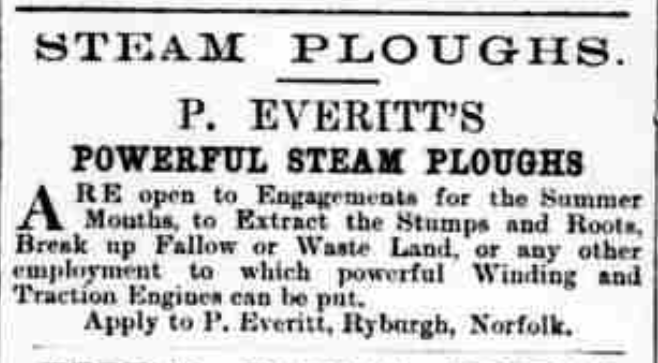
backed up with his terms and conditions, here transcribed from the June 3rd 1876 Peterborough & Huntingdonshire Standard:
STEAM CULTIVATION.
TERMS. The Prices of Work (as a rule) cannot be fixed beforehand. The Manager will make definite arrangements, according to the nature of the work, the following being the basis:- Cultivating according to depth, 10s. to 20s. per acre. Ploughing or digging according to depth, 10s. to 20s. per acre. Much depends upon the quantity of Work which is given, and the size and shape of the Fields. No deduction from the Acreage of the Field can be allowed for ponds, deep hollows, stacks &c., or other obstacles to the Work. Head-lands allowed for. Cash within one month after date of the account which will be sent in on completion of the work. The employer finds coal and water, keeps the engines supplied, and fills up the coal boxes when leaving, and sends on water to next place if required.
PROPRIETOR:-
MR. PERCIVAL EVERITT GREAT RYBURGH, NORFOLK.
AGENT FOR THIS DISTRICT (To whom all Applications must be made) :- Mr. JOHN MITCHELL, AUCTIONEER, VALUER, AND AGENT, SOMERSHAM, Hunts.
J. M. can also supply ENGINE COALS at very low prices.
The harvests of 1875, 1877 and 1878 were bad and it is possible that Percy’s burst of advertising was promoting mechanical cultivation as a system that, amongst other things, would allow work on the land which would otherwise be hindered by the weather. The following letter to the editor of the Norfolk Chronicle published on 28 April 1877 suggests that this might well have been the case:
DEAR SIR,- A report being circulated to the effect that the Earl of Leicester, finding the steam cultivation did not produce the beneficial results anticipated, has resolved to give it up. I beg to state I have his lordship’s kind permission to give entire denial to the report, as being utterly untrue in every respect.
The report might, if not contradicted, do harm to the progress of steam cultivation in Norfolk.
I am, yours most respectfully,
PERCIVAL EVERITT.
Evidence of these practical, public relations and legal difficulties continued through 1877 in the press. They do also contain the information that Percy Everitt now “had 5 or 6 engines “ to his name, so in spite of the bad harvests, the business was expanding during this time.
May 4th 1877
1st September 1877 Lynn Advertiser
IMPORTANT TO TRACTION ENGINE OWNERS.- William Baldock. of Stibbard, engine driver, was charged by p.c. Johnson with obstructing the highway at Walpole St. Peter on the 6th inst.- Mr Wilkin said he appeared for the defendant, who was in the employ of Mr. Everitt of Ryburgh and stated that before going into the case be would like to make a remark or two. If a complaint was to be established, procedings must be taken against the owner and not the driver of the engine. The present application was laid under the Highway Act, which was passed long before traction engines were thought of, and the charge was for obstructing the highway. Now engines like those in question were used far the purposes of cultivation and they must, when travelling from one place to another, stop somewhere, and it was general for them to stay at the road side. On the night in question the defendants engine did so stop at the road side at Walpole, but ample room was given for two or three carriages to pass abreast, and there- fore they could not be said to have caused any obstruction. A bolt in connection with the machinery was out of order
and it was necessary that it should be repaired, and this in part accounted for the delay of the engines on the highway. -Samuel Sizen, jun, Terrington stated that on the 6th August he was at Walpole St. Peter, between eight and and nine in the evening, and saw two traction engines, with a hut (in which the workmen slept) behind, upon the highway there. Steam was up at the time, and the engines were going at not less than six or eight miles an hour. Two persons who were driving along the road could not pass for more than a mile, because the engines were not pulled off the centre of the road. The drivers of the two conveyances would be detained 10 minutes or a quarter of an hour. Witness made up to the engines and shouted, but be could gain nobody's attention. There was a tremendous volcano of sparks coming from the chimney of the first engine, and witness's horse became frightened. Witness, who was accompanied by his wife and a friend risked going past, their conveyance being about a foot and a half off the dyke. Baldock was on the first engine and Grant on the second, and there were a good many people driving on the road, it being Bank holiday. After witness had got past he gave the reins to his wife, and went back to the engines and demanded the drivers' names. He could not find out the owner's name, but be discovered that of the drivers. The engines were afterwards stopped on the highway about an hour and a half, during a portion of which time the men left them. Steam was up all the time, and the engine working out of gear. The men were in a public-house part of the time. (Cross.examined} Witness had a great aversion to steam engines on the public roads. The road was 40ft. wide and the engines 8ft. or 9ft. in width. Witness set the police in motion in connection with this matter for the public benefit. Witness was returning home from Wisbech, and when on the road he saw a waggon attempting to pass the engines, and it would be detained half-an-hour. Went to a public house and saw Baldock there. He said they had come from March, and witness afterwards learned that Mr. Everitt was the owner of the engines. The engines when left stationary were about four yards from the crown of the road. Witness did not say the men were either drank or sober.- P. c. Johnson said about nine o'clock on the evening in question he saw the engines on the highway at Walpole St. Peter. Steam was up and the engines were working out of gear. Witness watched them for about three quarters of an hour. After doing so for about five minutes witness saw the men in charge of them walking along the Walpole highway. The engines were stopped, but steam was blowing off. It was dark and raining, and there were a great many people on the road, and the engines were in a very dangerous position. During the time that witness stood watching, several people came up and called out. One or two horses would not go past the engines, and there was nobody belonging to the machines to assist them past. The distance from the crown of the road to the front engine was 12:ft. 6in., and to the other 13ft. Witness was told that the men had gone to the Bell public-house, and he went there. Saw Baldock coming out, and asked him if he was one of the drivers belonging to the engines, and he said he was. Witness asked him what he meant by leaving his engines on the road. He said " How long have I left them " Witness replied " Over half-an-hour." Baldock said "We came here for something to eat; we have had no dinner." Witness asked if the engines had broken down, to which Baldock replied that they hdd not. Witness then told him that he must be aware that his engiaes had no right to stop on the highway. He said : "I am quite aware of that, but my engines have been accustomed to stop on the road, and I shall do so." Witness said : Do you intend that they shall stand on the road all night " and he said he did. Witness then inquired for his mates and went into the house to them, when they laughed at him. [Cross-examined .] None of the men were perfectly sober. The engine was standing on the footpath, and it trespassed on to the metal road. The men did not ask where they could find a place of a safety. The engines left the place at about five o'clock the next morning. Never heard about a bolt being made and fixed whilst the engines were stopped. The men said their engines had not broken down.-The Clerk: I think that according to the law no engine has a right to obstruct the free passage of the highway.- Witness continued: Something was amiss with the shaft of the water cart.- Mr. Wilkin for the defence said he would not make any remarks upon Mr. Sizen's statement as to the volcano of sparks and such like extraordinary expressions. The only person who had appeared in support of the case was Mr. Sizen, who had declared that he had a strong antipathy to these engines being on the highway, and who, when he found them there drove four miles to find a policeman and to inform him of the fact. Now he thought that some encouragement ought to be given to the owners of such engines. Mr. Everitt had five or six of them, and he would be able to tell the magistrates that they were very much wanted in the country, but at times when travelling from one district to another, no place could be found for their accommodation, except at the side of the road. He would ask under such circumstances where the engines were to go, and how was the business to be carried on if the machines were to be prevented from stopping at nights at the side of the highway? In Lynn there was a place provided specially for the accommodation of these engines. The men in charge of Mr. Everitt's engines had on the day in question come from March : they had had nothing to eat all day, and at night they went to a public-house for some refreshment, leaving their engines in safety at the side of the highway, giving ample room for conveyances to pass them, one engine being 13ft. from the crown of the road and the other 12ft., so that there was an abundance of room for vehicles to pass. He admitted, as Mr. Jackson had stated, that anyone had a right to an entire free passage of the highway, and that he might drive upon the grass at the side if he liked, but that he (Mr. Wilkin) would not prefer on a dark night. The men in charge of the engine must have food, and they must go somewhere for it.-The Chairman: The engines have no business to be left on the highway, and if other accommodation cannot be found for them stopping they must go on.- Mr. Wilkin : To say that the engines were working is pure nonsense ; they were stopped entirely and the fires banked up. He would be able to show that there was no obstruction at all.- The Chairman said it was all very well to say that the engines were no obstruction, but supposing that Mr. Sizen's horse. having taken fright, had run away and the occupants of the vehicle had been killed what would have been the verdict of the coroner's jury in that case?- The Clerk : A verdict of manslaughter, most assuredly.-Mr. Wilkin disagreed with the clerk. When, however, a case of the kind came under his notice, he would look more fully into it. He contended that it was an act of necessity which caused the men in charge of the engine to stop, and he denied the assertion of the witnesses that they were not sober. The magistrates in other districts permitted the engines to remain on the road aide.- Mr. Davies said he had experienced difficulty in driving in consequence of these engines using the highways. It was only a short time since he was driving behind one of them and he had to go more than a mile before he could get past see of them, and he had to go more than a mile before he could get past. -Mr. Wilkin said he never could see why the legislature had not made it incumbent to have a man with a red flag to the rear of the engine as well as in front. Anyone driving along a public highway had a right to get out of his conveyance and go into a public-house for a piece of bread and cheese and a glass of ale if he liked.- The Chairman: But you are bound to leave someone in charge of the horse- Mr. Wilkin: It is not necessary that anyone should remain with the engines, for they would not run away like a horse. Mr. Wilkin called the following witnesses for the defence:-Percival Everitt, Ryburgh, said he was owner of the engines, and that on the day in question his men were travelling from Somersham to Ryburgh, a distance of about 90 miles. Did not know of any place on the road into which the engines could draw. It was usual to leave them on the side of the road.-The Chairman : Surely you might find a field.-The Clerk In a case like that in question, am I to drive l0 miles because my horse will not pass your engines? - Witness: The road is as much mine as anybody's else.--Supt. Carter said the engines could have been drawn into the yard of the public-house where the men stopped.-Witness continued : The fly wheel was kept going for the purpose of feeding the boiler. The engine weighed 10 tons, and the width was 8ft. 6in. In reply to Supt. Carter, Mr. Everitt stated that he was not on the journey with his men. He did not order his men to keep with the engines, for it was certain that the engines would not run away.? John Grant stated that be started with the engines from March on the 6th ult. Baldock drove the fist engine and witness the second. Left March about six in the morning, and reached Wisbech at about six at night. They stopped to water at the Locomotive inn, Walsoken, and got to Walpole at twenty minutes past nine. They placed their engines as close as they could with safety to the ditch. Witness's engine wheel was about a foot and a half on the metalled road. Had had nothing to eat at all that day.-Supt. Carter What were you doing from 6 in the morning to 6 at night, coming a distance of 10 miles?-Witness: We stopped to water two or three times.-The Clerk: How fast do you travel? Witness : Four miles an hour.- Mr. Pattrick: When the men went into the Bell was the engine still working?- Witness: No,- Mr. Pattrick: Mr. Everitt has stated that the wheel was working, pumping water into the boiler, during the time that the men were in the house. Is that correct?- Witness said the engine was entirely stopped. In reply to Mr. Wilkin witness said they were obliged to have a bolt repaired during the time that the engines were stopped.- Mr. Metcalfe: Was there not an open space in front of the inn already referred to where the engine could have stopped without trespassing on the highway?-No answer.-This completed the first case, and John Grant, engine driver, Great Ryburgh, was then charged with a like offence at the same time and place. The evidence given in the preceding case was taken as read. In addition thereto. William Baldock stated that he arrived with the engines at Walpole at 20 minutes past nine. and placed them by the side of the road for the night. Witness's near wheel was about 18 inches on to the metalled part of the road. They first filled the boilers with water, damped the fires and then went for some refreshment. Was absent about 20 minutes, and witness then saw p.c. Johnson, who asked him if he had charge of the engines, to which he replied that he had. Johnson said: " Don't you know you have no business to stand at the side of the road? Witness replied " It is where we are accustomed to stand. Can you tell me anywhere where we can move them off the road? If so, I will move them at once." The officer replied : "No; I don t know anywhere," and he then said he should summon them. Witness ran as close to the ditch as he dared in order that he might leave as much room for the public as possible. [By the Chairman:] Two lights were left burning on one engine and one on the other. Witness sat up till half-past 12 with the engines. Did not assist any horse past. Would have helped one, but the driver told him to get out of the way. Left no one in charge of the engine whilst the men were in the public-house. [By Mr. Wilkin :] The next morning witness found that the water cart shaft was broken, and he had a bolt put into it at a cost of 6d. Did not know of anything passing whilst the men were in the public-houseThe public-house was about 100 yards from the engine. [By the Clerk:] Did not know the bolt was broken till the morning. Witness could have proceeded, but it would not have been safe. [By the Chairman:] It was about a mile and a half to the next public-house (the Woolpack ). -Supt. Carter said plenty of accommodation could have been provided there, but this Mr. Wilkin denied.-The magistrates having consulted, decided to fine Baldock £3 and £1/1/3 costs, and allowed the case against Grant to be withdrawn upon his paying the costs, £1/1/3. -Mr. Wilkin called attention to the fact that the magistrates had imposed a heavier penalty on the defendant than they were authorised to do. This statement occasioned some surprise, and after a perusal of the Act under which the charge was taken it was found that the highest penalty that could be imposed was 40/, sad this amount the magistrates decided upon.- Mr. Wilkin hoped that as that was the first offence the magistrates would reduce the penalty.-The Chairman said they would not do that. In fact the magistrates were inclined to be somewhat severe.-Mr. Wilkin then asked for a case, which was granted.
********
We have seen that the land on which the Foundry was built had been secured by Isaac Everitt back in 1868, leased as arable land and immediately alongside the Granary building which was part of the Mill properties. This lease was granted by Revd William Morse Boycott & others and was part of the Sennowe Estate. The Estate comprising 4,400 acres came up for sale in the early 1880’s. There is an inked date of 1877 on the cover of the copy of sale particulars examined but the contents refer in the list of tenants to the executors of the late Frederick Smith who died in 1881, whereas his brother George, who is not described as deceased, died in 1882. F & G Smith between them held 3000 of those 4,400 acres. This sale catalogue helps throw a little more light on the start up of the St. Andrew’s Iron Works. It offered for sale, "The Manor House"with its 1881 lease for 12 years to Isaac Everitt and “two freehold ground rents of £10 per annum each” A footnote states that Everitt and Adams had been granted a 99 year lease from 1877 and also a lease of 99 years from 1882. Additionally there was “a Freehold Ground Rent of £5 per annum secured on a Private Residence adjoining the Iron Works , and which is now in course of erection”. A lease of 99 years from 1882 had been granted to Mr.Thomas Cooper.
There seems to have been a significant re-settlement of the Morse Boycott Estates in 1893 with an associated legal case: “Browne v Collins” . It is assumed this judgement settled the matter.
A further sale catalogue of 1911 offers 4 farms, the Manor House and also the three ground rents of the foundry site for sale. F & G Smith bought the Manor House and the conveyance shows it was purchased of an A. Browne who must have been one of the beneficiaries of the Boycott Estates re-settlement. The sale catalogue highlights the considerable intricacies of the settlement in the “Conditions of the Sale”. Thus, in 1911, about half the Sennowe Estate of the 1880’s sale was sold away to different purchasers. It is assumed that Thomas Cooper/Farmers Foundry was able to purchase what was still known as the St Andrew’s Iron Works since £25 a year for the next 99 years doesn't seem like a good investment to make without an interest in the foundry. The 1911 catalogue says the first 99 year Foundry lease was signed on April 25th 1878 suggesting that by then, the buildings were probably completed and working. The 1880's catalogue states that they are at that time employing "about 40 hands"
Meanwhile evidence of recruiting the skilled men for his ironworks starts to appear in the press. They are found in December 1877
October 27th 1877
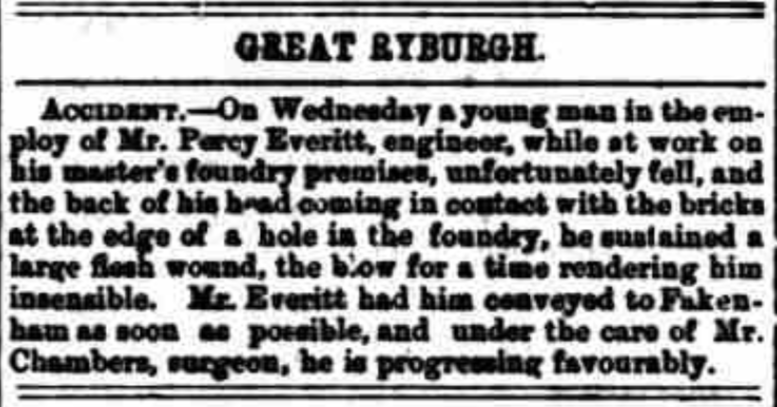
Dec 29th 1877


At the same time, Percy’s inventions are being patented and more to the point being manufactured, apparently by other firms, but exhibited by him and meeting with Royal interest as at the Smithfield Cattle Club Show, which had just enlarged to show implements:


Morning Post in December 1877
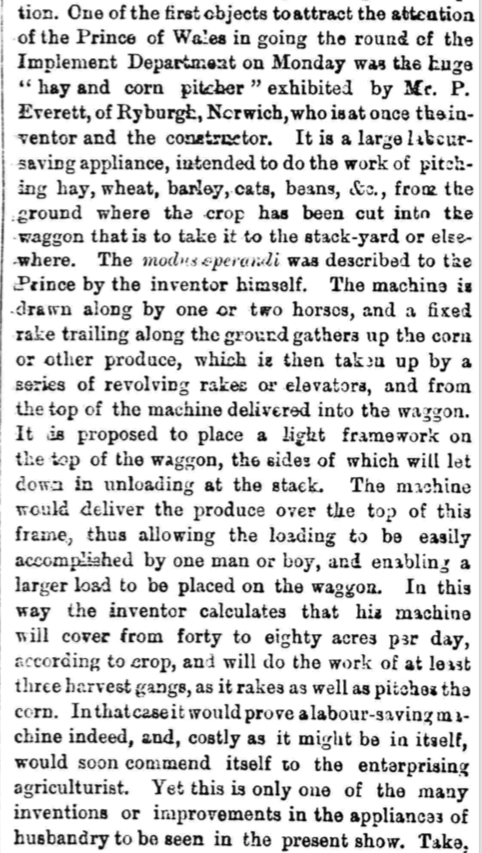
During 1878 the assumption has to be that the different parts of his business were developing nicely and his energies channelled into invention as these are most represented in the Press.
London Gazette February 22 1878

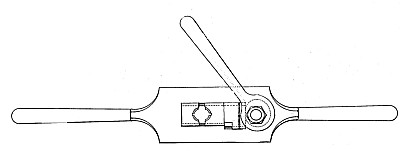
London Gazette April 9 1878

July 1878:
Since last year Messrs. Woods, Cocksedge, and Co., have produced a turnip thinner, patented by the inventor, Mr. Everitt, of Ryburgh. Two steel hoes, about a foot long and three inches wide, are fixed so that when drawn by horse power they would cut out of the line of turnips about a foot or so, and leave one plant standing. These hoes are adjustable, and can be heightened or lowered as circumstances may require.
London Gazette September 27 1878

This year is the first time Thomas Cooper makes an appearance in a joint Patent Notice and it is reasonable to suppose he collaborated with Percy on the planning of the Foundry These last two patents had considerable influence on the course of the business in the following year 1879 and the year we have the first appearance of William John Adams and the partnership that became Everitt Adams & Co Ltd.
This same patent was applied for in the USA 10 years later where we get a glimpse of this machinery :
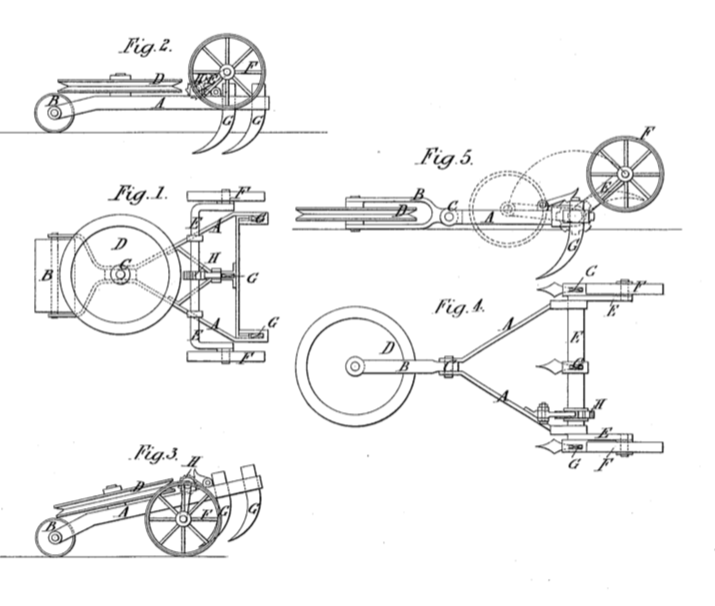
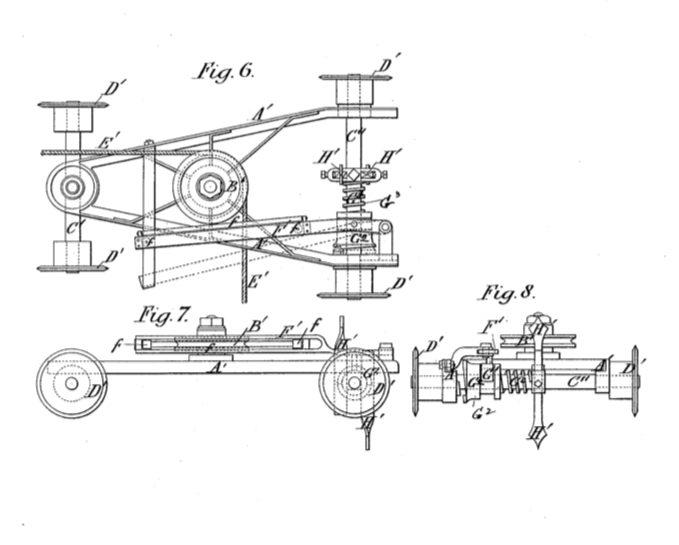
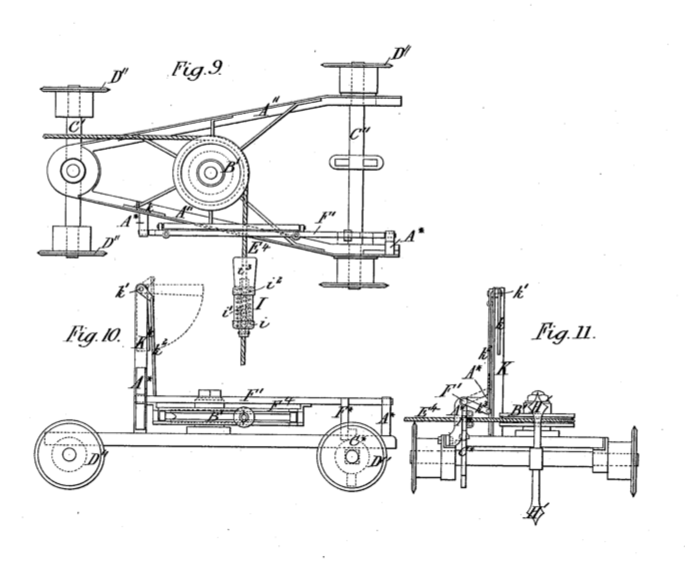
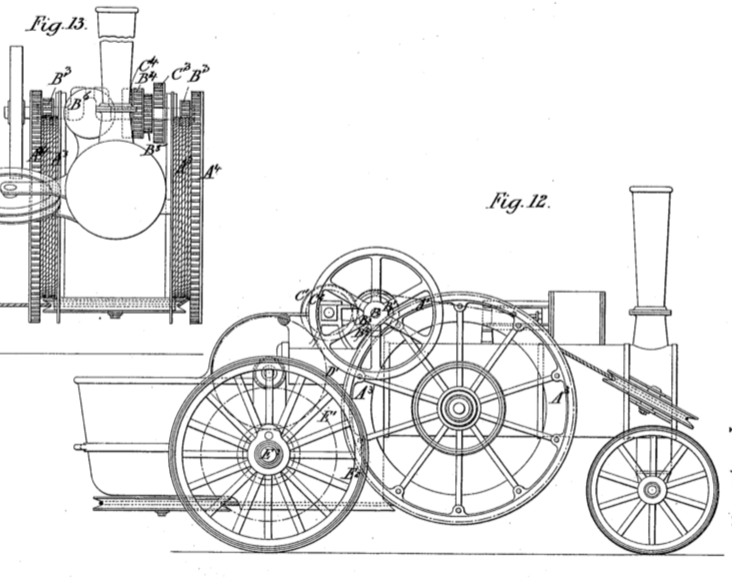
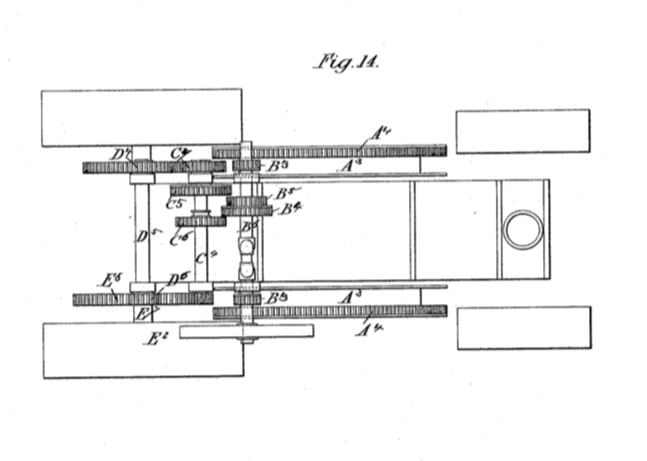
***********